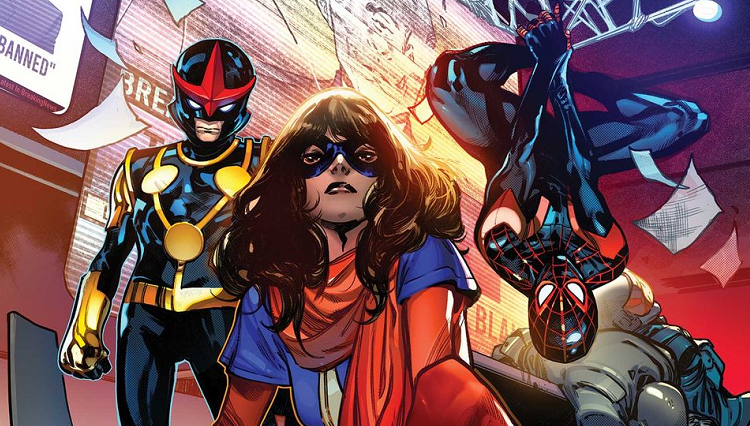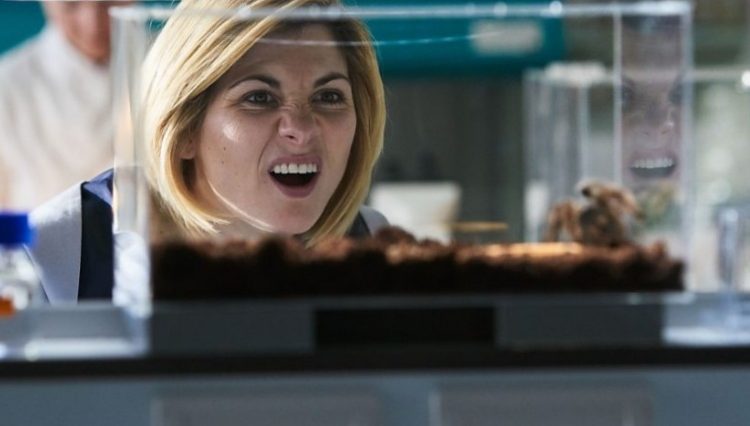“I cherish peace with all of my heart. I don’t care how many men, women, and children I kill to get it.”
The Suicide Squad, 2021 (Margot Robbie) Warner Bros./DC Films
I honestly don’t know what to make of The Suicide Squad, the third movie in a disturbing cycle of ultraviolent yet comedic DC fringe films that had its unofficial start with 2016’s Suicide Squad, which may itself have been influenced or inspired by the success of Marvel’s own fringe movie, Deadpool. After a succession of uneven adaptations beginning with Wonder Woman the following year, Birds of Prey (and the Fantabulous Emancipation of One Harley Quinn) was released in February of 2020, but failed at the box office, most likely due to the rise of the pandemic.
I suspect DC was less invested in the grander scheme (an ever-present story arc) than they were in entertaining the audience and allowing their filmmakers greater creative control than Marvel allowed. That is one point you have to give to DC: adherence to the filmmaker’s vision, even at the cost of logic, which, kind-of, explains The Suicide Squad. DC also seemed to recognize that there had to be a “secret sauce” in the Marvel formula, thus Joss Whedon, James Gunn, and others were invited to bring their respective visions to Detective Comics.
It didn’t quite work out with Whedon, because either he presumed he was expected to deliver his patented humor and pop culture-laced patois, or his bifurcation of Zack Snyder’s original vision ultimately emasculated Justice League instead of making it more palatable for the presumed short-attention-span demographic. Either way, it was a terrible decision that engendered bad will between the collaborators and the fan base. All of a movie’s worst problems can be solved either inside a typewriter or an editing room. Hiring outside help to save your movie very rarely works.
I think Gunn’s vision works because he wants to please himself first before bringing anybody else into the discussion. I can’t imagine a committee of studio heads throwing out ideas and “concepts” with regard to The Suicide Squad like they would with Loki or WandaVision. This movie is sustained madness, and very little of it makes sense, but it works. It works because the movie has a personality, and from that personality springs a peculiar substance generally missing in the newer comic book movies.
First off, Gunn wants to distinguish his movie from David Ayer’s 2016 Suicide Squad. He doesn’t want to call it Suicide Squad II: Attack of the Starfish Monster, or something similar. He calls it, The Suicide Squad, indicating this may be some sort of “soft reboot.” Next, he kills off most of the characters from Ayer’s movie (including Gunn regulars, Michael Rooker and Nathan Fillion as T.D.K., “The Detachable Kid”-a one-joke premise that lasts approximately 30 seconds in the film), with the exception of Joel Kinnaman’s Rick Flag, Margot Robbie, and Jai Courtney’s “Digger.”
Conspicuously absent from this movie is Will Smith as Deadshot. Idris Elba does a fine job as Bloodsport (wasn’t that a Jean Claude Van Damme movie?), even though he isn’t given much to do except react to other characters’ antics, so it’s no big whoop for me. In addition, Smith gets props for turning down that awful Independence Day sequel to do the first Suicide Squad movie. Good for him! Resurgence was one of the worst movies ever made … EVER. So let’s get to the actual squad. This is the Avengers from Hell!
A collection of losers, prisoners, deviants; some with powers, some with no powers (Yes, Virginia, there is a Polka-Dot Man!), with obvious parallels to the Marvel universe, namely Captain America: Civil War, wherein Rogers and Stark find themselves at loggerheads in how to combat the various threats to planet Earth, just like Flag and John Cena’s ridiculous Peacemaker character. The Suicide Squad is the Dirty Dozen of the comic book world, or maybe it’s the Rogue One of the comic book world. Thematically, it reminds me more of Hot Shots Part Deux (“Now we have to go in to get the men who went in to get the men who went in to get the men.”)
Viola Davis’ Amanda Waller (a lunatic herself) conscripts these nuts to sojourn into the Corto Maltese (first referenced in Tim Burton’s 1989 Batman) capital to gain the allegiance of rebel leader Sol Soria (Alice Braga) in their effort to rescue Rick Flag, possibly save Harley Quinn, and grab The Thinker (Peter Capaldi, completely wasted in this movie), the scatter-brained scientist in charge of something called Project Starfish. That’s the movie. Right there. Everything else is icing, I guess. A strange, disturbing purple and pink icing.
If only we had some structure with the story, The Suicide Squad could’ve been brilliant, but alas … as it stands, it’s still way better than Wonder Woman 1984 and Loki, but that’s not exactly high praise. You know what is interesting? The preponderance of unsettling, animated graphic violence in movies and TV shows these days. I mean, it’s warranted enough to give us an “R” rating, but it doesn’t stay with us, much like Army of the Dead. We don’t wash it off after we’re done viewing it, because it just … evaporates, almost as if it were nothing.
I watched Pete Davidson get shot in the head, and it did nothing for me. I watched a guy get ripped in half, and it did nothing for me. Is this where we are with violence in cinema these days? Remember when Marvin got shot in the face in Pulp Fiction, and we all gasped for five minutes as the movie kept going, turning his death into a hilarious slapstick sight gag? I know I sound like the old man yelling at clouds (even though the people who made this movie are technically older than me), but violence mattered more in movies of the past.
The fact that I was able to pretty much encapsulate the story in one long run-on sentence will give you an idea of where I intend to go with this review. Story. Yes, story. That The Suicide Squad doesn’t plumb the depths of concepts the way so many products do speaks to Gunn’s personal madness. One of the more distracting elements of The Suicide Squad is that there seems to be three “alpha male” characters in Elba, Kinnaman, and Cena. The rest, including Sylvester Stallone’s King Shark, fade into the background. The bad guys (what there are of them), are comparatively banal. There are way too many people running around to have a decent narrative progression.
It used to be we’d have one hero, one sidekick and/or comic relief, and a damsel or beefcake cohort. These archetypes were interchangeable, but they were always present in movies like this. Gunn gives us some memorable female characters for a change, all with negative and positive connotations. Waller is a power-mad lunatic. Braga is a brave leader. Harley is … well, Harley, but at least I didn’t forget them. I did forget the rat girl, Cleo Cazo (Daniela Melchior) but I think that might’ve been deliberate, so we could have that reveal of the millions of rats swarming over the Starfish monster and its minions.
For better or worse, The Suicide Squad improves upon the general malaise of recent comic book film adaptations. The movie is thankfully less interested in politics, social or otherwise than it is entertaining the audience. Would we expect any less from the writer and/or director of Tromeo & Juliet, Slither, and the Guardians of the Galaxy movies? Like most movies made for the streaming crowd, The Suicide Squad needed another pass through the editing room. The violence was needlessly gory, and the sex was limited to Harley’s psychotic preening, but otherwise, I enjoyed it, and will probably never forget it. I guess that’s a good thing.









